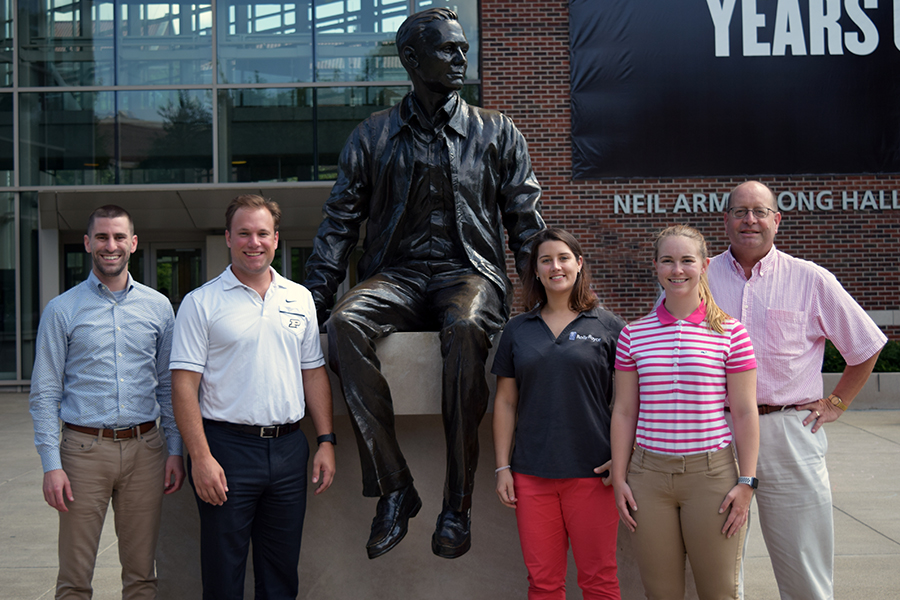Young professional alums return to campus, provide insight

Three Purdue alumni and a current graduate student comprise the 2018-19 class of the Young Professional Advisory Council.
The group, which includes alums Alex Baucco (BSAAE ’11), Alex Sener (BSAAE ’13) and Chris Zaseck (BSAAE ’09, MSAAE ’11, PHDAAE ’15) and PhD student Kate Fowee (BSAAE ’16, MSAAE ’18), was on campus Monday and Tuesday to discuss and give feedback on a wide range of topics with School of Aeronautics and Astronautics faculty and undergraduate students. Prof. Steven Collicott organizes YPAC and invites alumni from various backgrounds each year.
This year’s group that featured Blue Origin, GE Aviation and Rolls-Royce employees had the opportunity to meet with AAE Associate Prof. Karen Marias and academic advisors about curriculum, Prof. William Crossley about AAE distance education, speak with AAE 41800 (one of Collicott’s classes), tour the BIDC and other facilities, and meet with other professors and undergraduate students.
This was Sener’s third year as a member of YPAC, and he keeps returning because he likes to support his alma mater in that way, to provide benefits to the school that gave him so much.
“I think we’re in a unique spot to be able to visualize the impact that new students could have in their early career and how they can make a difference in finding those careers. It's at the intersection of where we can see our businesses going,” says Sener, who has worked in GE’s turbine design department for five years. “So we’re in a good position to be able to provide feedback to the school. I think that can add value.
“The industry is changing, so our feedback changes from year to year. I think that’s one of the benefits as well, trying to help keep the school’s hand on the pulse of the industry.”
Zaseck was the only first-timer in YPAC this year, and he hadn’t been back to campus since earning his PhD in 2015. But Zaseck, who manages the test group that conducts rocket engine testing at Blue Origin’s West Texas facility, was eager to return for this specific two-day event.
“It was an opportunity to give feedback into the program that I thought was responsible for my professional situation being as good as it is,” says Zaseck, who’s been at Blue Origin for about three years and whose work includes testing the BE-4 Engine. “It’s a good opportunity to meet students, see what they’re curious about and give feedback to them about how they can be better prepared to go to industry and work at companies like GE, Rolls-Royce and Blue Origin. It was just a good opportunity to interface with professors, hear about their thoughts on the curriculum, how it could change, just see the general path forward for Purdue.”
Baucco said Rolls-Royce has been especially supportive of her returning to Purdue for YPAC – this was her second time on the council – and she’s always looking to recruit Purdue students to the company. Part of that is helping undergraduates prepare for the next step into industry.
Baucco has held multiple roles since joining Rolls-Royce seven-plus years ago, and she can share those experiences, including those from her current role as design engineer in the Advanced Turbine Components group, working on ceramic matrix composite seal segments.
“I think that the program here is really good, but after having graduated and having gone into industry, there are things that, ‘Oh, I wish I would have learned this.’ Or ‘I wish I knew how to do this.’ I’m sure those things were available, but I think it’ll be really helpful for current students to know what kind of skills or opportunities they can grab while they’re here to better prepare them for industry,” says Baucco, whose work focuses on designing with a new material, called ceramic matrix composite, to replace some of the metal components in the turbine.
Fowee, who received her Master’s this summer, offers undergraduates a different prospective as a current graduate student. Though she has some undergrads on her research team, she’s otherwise rarely exposed to them. So being in YPAC – for the second consecutive year – allows her to share practical and relevant advice, especially on the transition from undergrad to grad student.
“So many of them don’t actually know what grad school entails when they actually apply … what to expect, what to do,” says Fowee, whose research has focused on micropropulsion for small satellites. “I had that. I had a grad student mentor who helped me. I think that’s really important, especially with how much this department relies on its grad students. We do a lot.”
